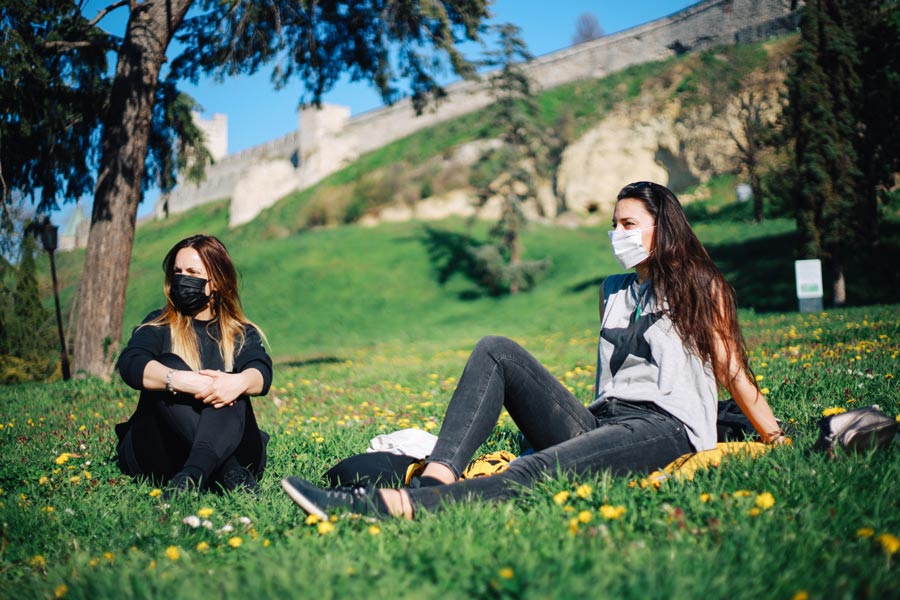While the sun may feel good on your skin, it is highly unlikely that it will prevent you from catching COVID-19. It will not rid your body of the disease if you already have it. And it could hurt you, too. Here’s what you need to know now.
During this season of social isolation, there has been a massive amount of information — some good, some not-so-good — about how to avoid getting COVID-19. You may recently have read or heard something about the disinfecting power of ultraviolet (UV) light, which we know is emitted by the sun. But we also know that exposure to UV light can lead to skin cancer, so The Skin Cancer Foundation dug deeper to root out the facts about UV and germs.
The sun emits energy that we call light, and we describe this light in terms of its wavelengths along the electromagnetic spectrum. UV radiation is one form of energy on this spectrum, and it’s important to understand that there are three types of UV light, each with different wavelengths and properties.
UVA light is responsible for tanning and can cause premature aging as well as damage that can lead to skin cancer. UVB causes sunburns and the damage that can lead to skin cancer. Broad-spectrum sunscreen (with SPF of at least 15 for incidental exposure and at least 30 for extended exposure), along with shade and proper protective clothing, hats and sunglasses, all help to protect you from UVA and UVB rays.
When you read or hear about germ-killing UV, however, don’t be fooled into thinking that exposing your unprotected skin to sunlight might kill germs on your skin or even inside your body, says Steven Q. Wang, MD, director of dermatologic surgery and dermatology at Memorial Sloan Kettering Cancer Center in Basking Ridge, New Jersey.
It is UVC light, with the tiniest and most energetic of the UV wavelengths, that is sometimes called “germicidal UV.” “However, UVC is very carcinogenic,” says Dr. Wang. “It is lethal. The reason we don’t worry about it when outside is because it does not reach the Earth’s surface.” If it did reach your skin, he explains, within minutes of exposure it would damage DNA in your skin cells. Similarly, though, artificial UVC light can damage the genetic material of bacteria and viruses, including, potentially, the novel coronavirus that causes COVID-19.
For decades, devices emitting UVC light have been used by hospitals to kill pathogens on surfaces and in the air. “But because the UVC radiation is so dangerous, these devices are only used when rooms are unoccupied,” says Dr. Wang. Handheld and other small UVC disinfectant lamps or “wands” are available for purchase online and may be effective at killing germs on surfaces such as counters, doorknobs and cellphones. “I cannot stress enough that these specifically designed UVC light sources are not safe for use on humans or pets,” Dr. Wang says. “You could be risking your life to use these devices like that.” For the first time ever, in fact, New York City shut down the subway system this spring each night to thoroughly disinfect trains, and UVC light is one method being used. The cars must be empty to do this safely, and anyone operating UVC devices, on trains and in hospitals, does so from outside of the room or car.
“I cannot stress enough that these specifically designed UVC light sources are not safe for use on humans or pets,” Dr. Wang says.
Can sunlight help disinfect objects, though, like laundry, shoes, packages or mail? We hear about people putting such items in the sun “to quarantine” for a few hours. “Viruses degrade over time on objects like paper, cardboard and fabric,” says Dr. Wang, “and while it won’t hurt to leave most common items out for sunlight exposure, people should follow the CDC guidelines to prevent COVID exposure.”
While more research is needed on how coronaviruses and sunlight interact, we have known for decades that UV radiation can damage your skin and lead to skin cancer. The bottom line? Practice proven prevention on both fronts this summer, advises Dr. Wang: Stay home when you can, wash your hands frequently, practice social distancing when you do go out — and protect your skin from the sun!




